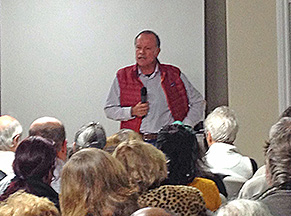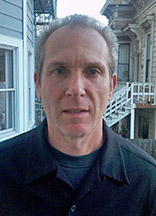Monday, February 24, 2014
S.H.A.R.P.’s Febuary 24, 2014 General Meeting featured speakers on San Francisco’s Affordable Housing Crisis (and What to Do About It). First however, Crispin Hollings and Tyrone Jue from SF Water/Power/Sewer presented information about the current proposal for an increase in water and sewer rates, to be phased in over a 4-year period. If all approvals are given, the new rates will become law around July 1 of 2014. Mr. Jue stated that for the past 10 years, the city has been seismically upgrading its water delivery system (at only 2% above budgeted costs), the goal of which is to restore minimal service within 24 hours after a major seismic event. Mr. Hollings stated that San Francisco’s rates are in the “middle of the pack” as compared to a number of other public water systems. The increase will be used to continue to fund projects and operations and maintenance. The increase in water rates, if approved will amount to approximately 40% over the four-year period beginning July 1. Additional and updated information is available at sfwater.org.
The evening’s featured speakers were Tim Colen, Executive Director of the SF Housing Action Coalition, and Peter Cohen, Co-Director of the Council of Community Housing Organizations. Each speaker gave an overview of his view of the situation, then asked questions of the other speaker. Finally, the audience directed questions and comments to the speakers. Mr. Colen articulated his concerns for the environment as a result of urbanization and global warming. He noted that employment is very strong in San Francisco, and he agreed that middle-income residents are getting priced out of the city. He laid the crisis squarely on the restrictive policies that he said make housing scarce and expensive. Mr. Colen said that San Francisco needs to increase its height and density limits and to allow the market to meet the needs of residents. Mr. Colen’s organization works with for-profit and nonprofit developers, architects, and planners.
Mr. Cohen posited the question: “Who benefits from development?” He stated that not enough housing is being produced for everyone other than “market rate” customers. He stated the true crisis is affordability, and that perhaps 15% of the city’s residents can afford market rate housing. He stated that San Francisco has the largest “wealth gap” of any city in the county, and that just allowing continuous building is based on a “trickle down” theory that will not work, because it does not address the issue of affordability. Mr. Cohen proposed that the city provide for “mixed income” building and that it build units for individuals and families at specific income levels.
The speakers agreed that middle-income residents’ needs are not being addressed in the current housing environment. The event was such a success that all seats were taken, and the audience’s participation was spirited.
At the start of the meeting, we distributed index cards and asked people to answer two questions at the end: (1) Do you think you are significantly better informed about the affordable housing crisis in San Francisco than you were at the start of the evening? and (2) Rate the meeting 1-10, with 1 being terrible and 10 being terrific. We got 35 index cards back. 30 people said they were better informed, 4 said not, 1 didn’t say. The average rating of the meeting was 7.56. The grades ranged from 4 (one person) to 10 (several).
For more information, see this article in the New York Times of February 24 on how Mayor Lee is dealing with the problem.
Tim Colen recommended these three articles: (1) “The San Francisco Exodus” by Gabriel Metcalf; (2) “How to make SF housing more affordable” by Enrico Moretti; and (3) “Why housing costs keep rising in San Francisco” by Michael Rhodes.
Peter Cohen recommended an article in the Examiner about the affordable housing plan formulated by his group, the Council of Community Housing Organizations. You can read CCHO’s plan itself here.
Update: In August 2014, the California Housing Partnership Corporation published a four-page report, “How San Francisco County’s Housing Market Is Failing to Meet the Needs of Low-Income Families.” Among other things, the report found that (1) San Francisco has a shortfall of about 41,000 homes for residents with very low or extremely low incomes; (2) median rents in the city increased 22% between 2000 and 2013 while median incomes declined by 2%; (3) almost 60% of people with very low incomes spent more than 50% of their incomes on rent; and (4) since 2006, more than 26,000 renter households have entered the San Francisco market, far outpacing production. The report includes a six-point list of recommendations.
In September 2014, the Housing Action Coalition held a panel discussion on solutions to the problem of inadequate affordable housing in San Francisco. The panelists included Colen and Cohen. Here is a summary of that discussion. HAC’s 2014 Housing Action Plan is an 8-point, three-page document.
In November 2014, the city’s planning department released this six-minute video explaining the affordable housing crisis in the city and the city’s attempt to address it.

